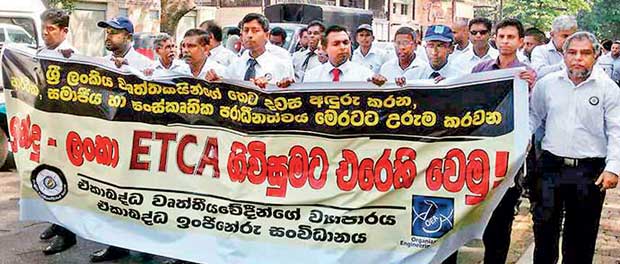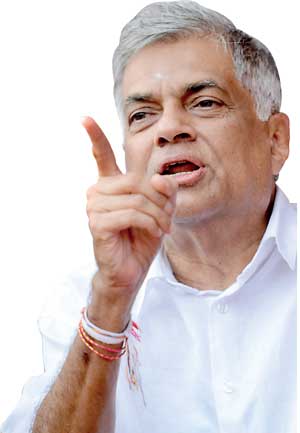01 Mar 2016 - {{hitsCtrl.values.hits}}

 The secrecy and the heat surrounding the proposed Economic and Technology Cooperation Agreement (ETCA), has left both supporters and opponents in a state of confusion and frustration. As a result, many of the local professional bodies fear Indian professionals would flood Sri Lanka and take away the limited lower middle level jobs.
The secrecy and the heat surrounding the proposed Economic and Technology Cooperation Agreement (ETCA), has left both supporters and opponents in a state of confusion and frustration. As a result, many of the local professional bodies fear Indian professionals would flood Sri Lanka and take away the limited lower middle level jobs.
On the other hand the Prime Minister argues that it will pave the way to create a million new jobs. However, protesting professionals argue that the ETCA will displace those currently employed in management and professional positions but also the future opportunities for those professionals entering the job market for the first time.
During the previous regime the fear that CEPA would open the floodgates to unemployed Indian specialists to invade Sri Lanka, resulted in a major show down between the government and many of the professional bodies. ETCA is in fact is clearly a modified version of CEPA without the provisions for the migration of natural persons.

The critics of ETCA have however equated it to the old Comprehensive Economic Partnership Agreement or CEPA, which is not the case. In fact, with the change in UNF government in 2004, CEPA was abandoned, but revived again by the PA Administration and put on hold due to pressure from with in the government. In 2011, when Sri Lanka was faced with a severe balance of payments problem, the Government attempted to revive the agreement but failed again, despite both governments appointing a high level committee including a Rajapakse to look into CEPA and implement it. Unfortunately for the current government the scars of CEPA has rolled over to the current agreement due to official and ministerial bungling.Ranil’s vision for Sri Lanka
The GMOA must understand that the Prime Minister is a man on a mission, having worked with the Prime Minister since the early 1990s with confidence I can say his life-long political mission has consistently been to make Sri Lanka a better place where all Sri Lankans irrespective of their race or religion could enjoy a good living standard and be treated like equals.
Therefore, professionals should not have any fear that the government would ink an agreement that would jeopardize the future livelihoods of our professionals.
In fact, Prime Minister Ranil Wickremesinghe said on Tuesday in Parliament that under ETCA, free migration would not be allowed between the two countries. Wickramasinghe went on to say he is fully aware of this concern and free movement of labour will not be allowed under ETCA and that the engagement should happen step by step and we have no intention of opening up sectors entirely.
Further more he reassured parliament of transparency and insisted the Government would go ahead with plans to establish trade agreements with U.S, China, Pakistan, Turkey, Singapore, and several East Asian countries among others. He also stated the Economic and Technical Cooperation Agreement (ETCA) would be tabled in parliament where it will be openly debated. But the Prime Minister insisted discussions would continue with the Indian delegation arriving on the 4th of March and the agreement would be signed by mid 2016.
Drawing comparisons Wickremesinghe pointed out the majority of industries had managed to weather open economic policies and would do so again when Sri Lanka completed the fresh host of economic reforms needed to create one million new jobs.
He also insisted the relevant ministers would seek the views of parliament parties when formulating the framework for ETCA. Ranil who was visibly upset went on to say “Genuine patriots would present progressive ideas for this proposal. Instead various organizations and individuals are spreading misinformation, hatred and myths about ETCA to derail the agreement. I have explained this numerous times to various stakeholders but they continue to make this an issue. I will do so once again. However at no point will we let these detractors win,” he stressed. The former Comprehensive Economic Partnership Agreement (CEPA) was re-discussed by the Government during the visit of Indian Prime Minister Narendra Modi however, both sides agreed according to sources to set aside CEPA and focus on ECTA.
Way forward
Going forward, the Government must commit to a continuous consultation between the main stakeholders to soften the Opponents of ETCA who argue that this will flood Sri Lanka’s service sector with Indian professionals, given that Indian IT professionals will not have a chance of opening up their businesses in Sri Lanka and to become a threat to our IT professionals. Generally, international service trade has four approaches, three of which, namely, cross border trade, consumption abroad and commercial presence were already taking place in Sri Lanka’s IT sector. The opposition to the agreement arises from the fear that it will allow the fourth method of services trade, ‘presence of a natural person’.
The agreement according to the PM will not include the fourth method of trade and therefore, there is no possibility of Indian professionals threatening Sri Lankan jobs. Therefore it is in the best interest of the government to readily make available the relevant documents for public scrutiny and for consultations with professionals. A professionally qualified and credible Minister should be tasked to discuss the framework with the key professional organizations and convince them that the ETCA is still in the discussion stage by expert groups in the two respective countries and for example the process for registration of professions etc. will be followed like in other developed countries.
Furthermore, through a proper consultative process, it could still accommodate the views of all those who have a genuine stake in Sri Lanka’s future. These issues should not be aggravated by Ministerial tirades against journalists and also against Sri Lanka’s powerful medical lobby. Equally, the GMOAs response also leaves much to be desired. Ranil’s annoyance appears to be driven by the fact that some journalists and doctors were ‘instruments’ of the Rajapaksa regime, however, this Government should not be culpably blind to potential perils of believing that every person who comes onto the streets to oppose the ETCA are against the agreement, that can bring out double and treble that number, leading to further chaos on the streets. In the final analysis, other than Ranil who has made a huge effort to drive home the benefits of the ETCA the people directly responsible for marketing the ETCA have largely done a very poor job.
(The writer is a HR Thought Leader)
26 Nov 2024 39 minute ago
26 Nov 2024 1 hours ago
26 Nov 2024 1 hours ago
26 Nov 2024 2 hours ago
26 Nov 2024 3 hours ago